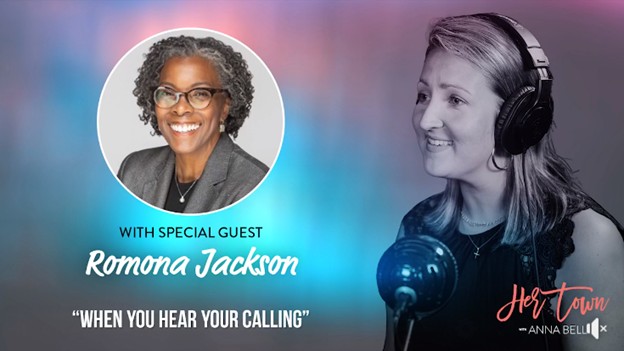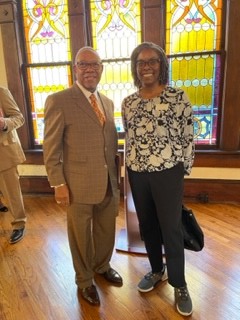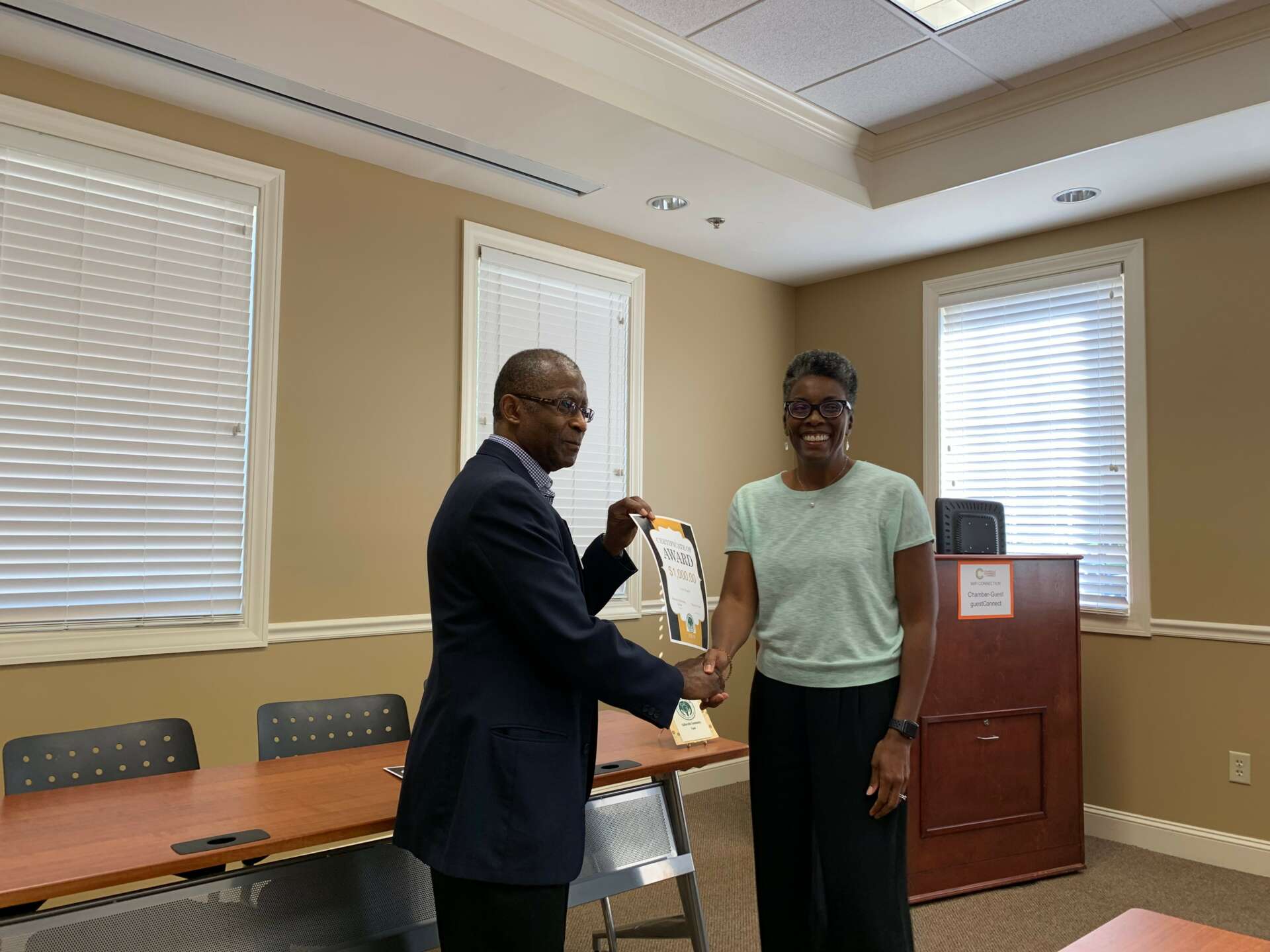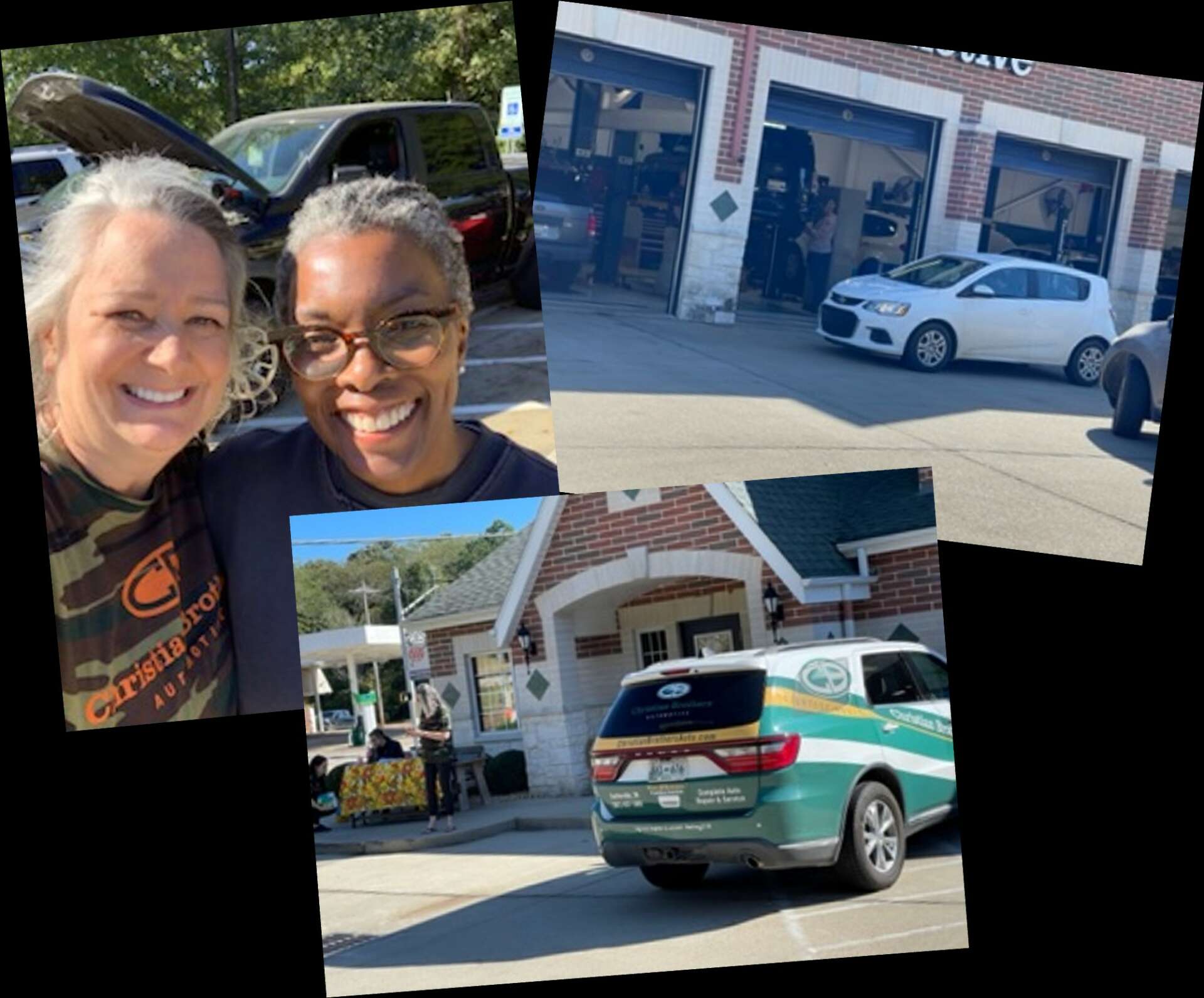We’re excited to introduce you to the always interesting and insightful R. Romona Jackson. We hope you’ll enjoy our conversation with R. Romona below.
Hi R. Romona, thanks for joining us today. We’d love to hear about how you went about setting up your own practice and if you have any advice for professionals who might be considering starting their own?
I have led several start-ups over the last 10 years. In 2011, I started a law firm to represent immigrants with dignity and respect. A few years later in 2014, I moved to Europe with my husband and started a grassroots organization in Krakow, Poland. The organization, Unchained, was focused on raising awareness about human trafficking in central and eastern Europe. Returning to the United States, I started a nonprofit in 2018 to empower and support survivors of domestic abuse in suburban communities.
With each of these endeavors the goal has been the same – to raise awareness by highlighting a public health concern and to assist those impacted. Getting the work done of starting an organization requires developing a strong business plan, bringing smart people on board, being self-aware, while also recognizing the need for God’s guidance and wisdom through it all.
Some of the key challenges to launching out into the deep by starting something from nothing is that there is no blueprint for the unique firm or practice you want to start. When I say, there’s no blueprint, I don’t mean there aren’t books and guides you can access, I mean that each person is going to bring something unique to their project. What works for me, may not work for someone else.
That could mean the road can be rocky as you travel to a place where there is stability in your firm or practice. Making the right choices and connections can be challenging. When starting out, you are looking for people who are passionate about your work and who will agree to walk alongside you as you grow. You need funding, you need operational best practices, and you need staff. The best approach to all of this would be to have a coach, someone who has created a blueprint, walk you through what’s needed and along the way provide you with coaching on how to be successful.
There are books describing how to maximize your business intelligence and books on developing your emotional intelligence. I think you need both in starting up a new firm or practice. You need a book that brings those two pieces together in one place. Similarly, you need spiritual intelligence. For me, that looks like trusting God – for everything. Nothing in my life works without that piece.
Looking back, what I would have done differently is to plan for success. Yes, it sounds odd to say it, but with each of the start-ups I mentioned earlier, my only plan was to serve and meet the immediate needs of those identified as our target population. Not once did I imagine that any of those undertakings would be successful. If I had considered that, I would have also considered how to manage rapid growth. I would have given more thought to scalability and the technology needed to expand with an organization.
There were so many tools that would have helped me in my past work. I name many of these in a book I wrote, “Starting and Serving, Your Personal Guide to Launching a Successful New Career as a Nonprofit Leader”. My desire in authoring this book was to bring together all the tools needed for successfully launching a new career as a nonprofit leader. I wanted to make available to others what I would like to have had when I started my nonprofit. In addition to the book, I make available coaching sessions. It’s important to have someone you can go to who will listen without judgement. Following your dreams takes courage. You need someone who understands that and serves as a champion for your cause.
For young professionals, I would suggest three things. The first is, don’t be afraid to fail. When you fail, you are always going to learn something. Failure represents an attempt, a willingness to take a risk, and the courage to ask, “what if”. Second, I would suggest, looking in your heart and really understanding who you are. What are your triggers? Do you have unresolved hurt and trauma? What trips you up, your proclivities? What is the work you would do, even if you didn’t get paid? And, if you have a faith, ask what you believe about God and the purpose He has for your life. Those are good questions to sit with and answer honestly.
Lastly, I suggest if you desire to start a firm or practice that you make a plan. Work your plan, Trust your plan, but be willing to adjust your plan, as necessary. I wouldn’t adjust the core of what you plan to do unless that really isn’t working. However, it is important to recognize when the plan is insufficient and to adjust accordingly.


Awesome – so before we get into the rest of our questions, can you briefly introduce yourself to our readers.
I am an author, a licensed attorney, a community leader, a guide, and a risk-taker. I love God and sharing with others about HIs grace, love, and mercy. One of my former managers described me as a “bleeding heart.” In some ways, I guess that’s true. I’m often looking for ways to serve the broken-hearted, the lonely, the hopeless, and those who have had their voices silenced. For many years, this thread of serving vulnerable people groups has been weaving its way through my life.
In my early twenties, I volunteered as a Court Appointed Special Advocate for Children with the Juvenile Court in my area. I served in that role for 11 years, speaking in court for children who had been abused and neglected. Other volunteer work includes tutoring at an inner-city charter school, leading ministries at various churches, serving on boards and committees with local civic organizations, and working as a pro bono attorney in the community.
Serving is where I find joy. I became an attorney because I wanted to serve people who were economically challenged. That desire led me to become an immigration attorney. In that role, I represented mostly women and families who were seeking asylum in the U.S, after suffering some form of persecution in their home country.
In addition to practicing immigration law, I also practiced civil law and family law. Those practice areas exposed me to women who needed orders of protection. After receiving an order of protection, those women often had nowhere to turn for the wrap-around services they needed to gain stability for them and their children. Wanting to help, I began offering referrals to local agencies that could assist these women.
Then, I realized there was no comprehensive victim-service organization for women in the suburbs who had experienced domestic abuse. That led me to start The Women’s Advocacy Center in 2018. Since then, we have provided over 350 services to women and their children in rural and suburban communities in West Tennessee.
At The Women’s Advocacy Center, our mission is to empower and support survivors of domestic abuse. We accomplish this by educating women on how to gain economic independence and form healthy relationships, while stabilizing their families and strengthening their faith. We serve in this way not only to end harmful cycles of domestic abuse, but to also encourage policy change and raise awareness.
What I am most proud of is the life change I see regularly in women who complete our program. Most who come to us for help have a sense of hopelessness. Their lives have been mired by years of domestic abuse. Sometimes, they weren’t believed, even by people close to them. Many are ashamed.
Through one-on-one mentoring, financial assistance, and an investment in their overall well-being, we help women regain their footing and to begin to take positive steps forward. Those steps lead to better parenting, new jobs, new homes, supportive community, and healing. When they tell me how our team literally saved their lives, I am grateful we are able to serve in the community the way we do.
Our model is different. It’s a deep, vertical model that provides holistic intervention in a survivor’s life. The goal is not to give a woman more rules to follow, but to allow her a safe place to grieve, to grow, to heal, and to decide how she wants to move forward. Our team is trauma-informed, and our care is laced with an understanding that we are all wounded in some way.
With that understanding we open our hands and hearts to serve as best we can. It may sound cliche, but we meet each woman where she is, and we walk with her forward from there. Community partners undergird our work with their prayers and tangible support. Working together, we are making a difference that will impact generations.



We’d love to hear a story of resilience from your journey.
Resilience makes me think of a tree in a strong storm. The tree bends, but it doesn’t break. It withstands the onslaught of wind, rain, and pressure no matter how long the storm rages. Some say this happens because the tree has strong roots. Others have said it’s because the tree is young and strong, or maybe it’s because the tree is old. An older tree knows that the storm will not last. All it needs to do is hold on.
Whatever the reason for the resilience of trees, my resilience is due to a combination of my faith and having people around me who encouraged me, stood with me, and at times sheltered me. My faith informs everything I do. The teachings of my faith assure me that I am not alone, no matter what. They also reassure me that the storms of life will end and that I can be victorious.
Good people around me confirm these truths. This was particularly important when I was on the journey to becoming an attorney. I went to law school at 40-years old, after a 16-year career at a Fortune 100 company.
Law school was challenging. I failed a key class and had to repeat it. When I graduated, I didn’t pass the bar the first time. There were times I wondered if I would ever become an attorney. To achieve my dream, I kept getting up every day and finding work that was fulfilling. I kept moving forward. I continued to be honest about where I was and how I felt. I remained focused and kept taking steps that eventually led to my swearing in ceremony as a licensed attorney.
The years from when I started law school to that ceremony were not easy. There were many tears (delete the word “were”) shed. If I had not had those experiences, I perhaps would not be as empathetic, patient, supportive, or understanding with others. I needed all of that to become who I am today. There were days when I was pushed low. God helped me stand firm. I didn’t break. From this place, I can encourage others on whatever journey they find for themselves.
How about pivoting – can you share the story of a time you’ve had to pivot?
In December 2014, I was living my dream. My law firm was doing well, I was in leadership at my church, my husband had a wonderful job, and we had good relationships with family and friends. We worked, we traveled, and we served in our community. It was a good life.
Then, my husband’s company offered him an ex-pat assignment in Krakow, Poland. The assignment would be for two years. If we agreed to it, we would leave our home and move to Europe within four months. We agreed.
Leaving everyone and everything we knew and loved was scary. It was especially scary to leave my law firm. This firm, I’d started alone would now be managed by my new partner. I wondered what I would do and who I would be if I wasn’t practicing law. An acquaintance suggested I pray about why God was moving me to Europe at this time in my life. She suggested it was not just because my husband’s job was moving us there.
My hope was that I would be able to continue working with my firm while in Europe. I could perform the more transactional work. This would mean filing applications and briefs by mail with immigration courts. My partner would focus more on the litigation side of our work.
However, working with a seven-hour time difference between Europe and the U.S. caused complications. I had difficulty communicating with clients. This placed a lot of stress on my partner, who felt she was carrying more of the workload than she intended. Dissatisfaction on both ends eventually led to the dissolution of the law firm. My heart was broken.
During the days after dissolving the firm, I thought a lot about what my acquaintance had told me. I needed to know why I was in Krakow, Poland. Searching for answers, I started meeting with other ex-pat women.
In one of those meetings, I met some women who wanted to raise awareness about human trafficking. Their ideas were impressive. What they needed was organization. Taking what I’d learned in starting my law firm I helped form a group we decided to name, Unchained.
Once we formalized the name, we brought local women into the organization. They helped us find a meeting place and helped us better understand the cultural dynamics of their community. Over the next year, we booked speaking engagements, held fundraising events, partnered with non-governmental organizations, and even helped launch a safe house. It was just what I needed.
Working with Unchained filled my days. It was also pivotal for my life. In leading that organization, I realized front-line advocacy in a foreign country was dangerous, hard, and yet incredibly fulfilling.
I lived in the city, served in the city, and I partnered with local and foreign women in the city. As a Black woman in a city where ninety-eight percent of the people are white, I was also quite visible in the city. There were times when we were legitimately concerned for our safety.
This was not the work I saw myself doing; however, it was right where I needed to be. I had to pivot from what I had known. Doing so gave me the ability to embrace the unknown adventure of serving in a foreign country.
I see now how that work prepared me for starting and leading a nonprofit in the suburbs of Shelby County, Tennessee. As in Krakow, Poland in the suburbs there are cultural norms and small communities. To make an impact you need to form strong partnerships with other organizations. You need local people to support your work and you need courage.
If I had not been willing to pivot from what I had done or had planned to do as an attorney, I would have missed so much. I would have missed an opportunity to grow. The new friendships I made in Europe and still have now would not have occurred. More importantly, the courage I found to raise my voice advocating for women in need would not have taken root. In short, pivoting gave me a distinct perspective.
By pivoting, I could see where my skills and talents could be used for a different purpose. Pivoting helped me see how professional disappointment and hardships could lead to new endeavors. By pivoting I saw how a team could do far more than I ever could as an individual. Pivoting also made clear the importance of holding everything in my life loosely.
The reality that everything is temporary was not plain to see when I signed the papers to dissolve my law firm. Nor was the possibility of adventure in view then. To grasp the reality of those statements I had to begin looking for what else God had for me. Through my work with Unchained, I realized He had much more for me than I thought or could have imagined.
Holding something new in your hands requires that you open them. When you do, you may find, there is also something you need to release. That can be scary. It’s like leaving everyone and everything you know to live in a foreign country. Pivoting takes courage to embark on an unintended journey. The blessing for your life is on the other side.
Contact Info:
- Website: www.womensadvocacycenter.org
- Instagram: the_womens_advocacy_center
- Facebook: www.facebook.com/womensac
- Linkedin: The Women’s Advocacy Center
- Other: Persona website: www.outintothedeep.com Personal LinkedIn account: R. Romona Jackson, Esq.
Image Credits
Headshot courtesy of Antoine Lever at Lever Studios in Memphis, Tennessee


